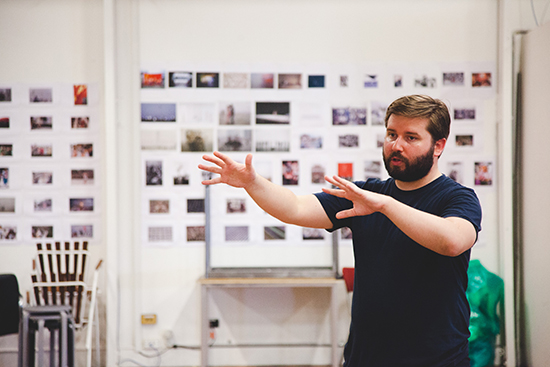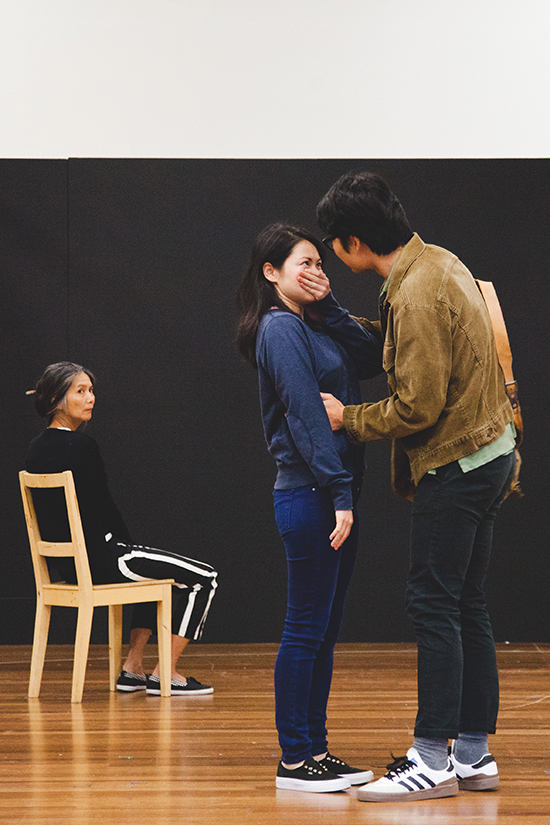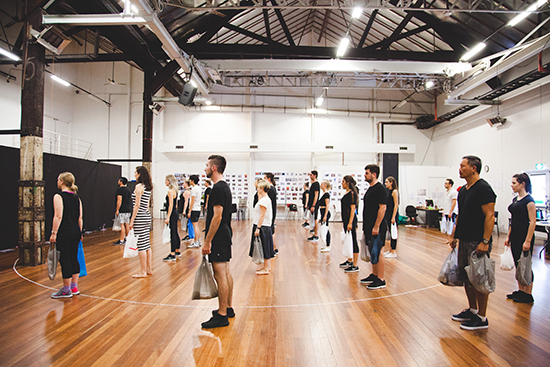AUDIO: A dangerous beast
Keith Gallasch: interview, Kip Williams, director, Chimerica

Kip Williams in rehearsal, Chimerica, Sydney Theatre Company
photo Hon Boey
Kip Williams in rehearsal, Chimerica, Sydney Theatre Company
BACKGROUND TO THE INTERVIEW
As tensions escalate between co-dependent superstates China and America, STC Artistic Director Kip Williams and Keith Gallasch discuss Lucy Kirkwood’s Chimerica, its alarming timeliness and the director’s determination to maintain a sense of human scale in a three-hour, large-cast epic.
Events in the play are triggered by information given to a photojournalist that the Tank Man who, in 1989 and with plastic shopping bags in hand, stared down a Chinese army tank in Tiananmen Square, is alive and living in the US. The search begins, meshing the lives of the photographer, his contact in China (whose wife died on the Square) and an English demographer with an understanding of the cultural differences between state and democratic capitalism. While the Chinese writer is subject to direct political repression, the dangerously zealous photojournalist is constrained by the politically nervous editor of a major American newspaper. The action plays out against scenes of protest from 1989 in China and an Occupy-type protest in the US late in the play.
The title of this epic play conjures, first, the chimera—a beast from Greek mythology with a lion’s head, a goat’s head rising from the creature’s back and a tail ending in the head of a snake—and then its embodiment as a hybridised China and America. The label “Chimerica” was invented by economists Niall Ferguson and Moritz Schularick in 2006. They saw these two nations as being dangerously co-dependent: mutually hostile and intricately entwined economically, with the US at the greater disadvantage in the event of divorce. China has invested some $800 billion in US government securities and the US had a trade deficit with China of $366 billion in 2015. The danger for the rest of us in an unravelling of “Chimerica” is that with the two countries accounting for at least half of recent economic growth, a third of GDP and quarter of the world’s population, any disruption will have severe global consequences.
In 2014, Chimerica won an Evening Standard Award for Best Play and the Laurence Olivier Award for Best New Play. Having started out as an improviser, Lucy Kirkwood began writing for the stage in 2005 with subjects including the terror of war, sex trafficking and sex in the mass media (the award-winning It Felt Empty When the Heart Went At First But It Is Alright Now; 2015).

Chimerica in rehearsal, Sydney Theatre Company
photo Hon Boey
Chimerica in rehearsal, Sydney Theatre Company

Chimerica in rehearsal, Sydney Theatre Company
photo Hon Boey
Chimerica in rehearsal, Sydney Theatre Company
Sydney Theatre Company, Chimerica, writer Lucy Kirkwood, director Kip Williams; Roslyn Packer Theatre, Sydney, 28 Feb-1 April
RealTime issue #137 Feb-March 2017






